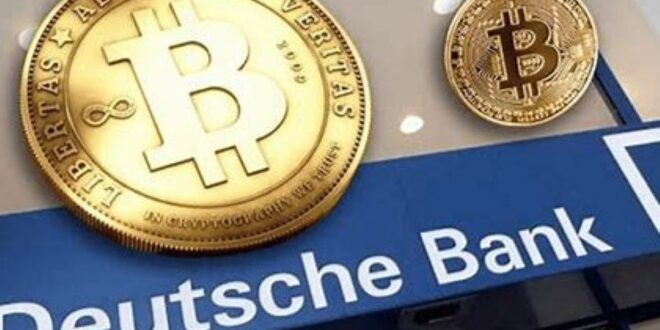In a strategic move that highlights the growing mainstream acceptance of cryptocurrency, two of the world’s largest financial institutions—Deutsche Bank and Standard Chartered—are making significant strides towards expanding their presence in the U.S. crypto market. Both banks are positioning themselves to capitalize on the rapid growth of the digital asset space, marking a pivotal moment for the convergence of traditional finance and the crypto world.
This expansion is a clear indication of how traditional banking giants are increasingly looking to integrate with the blockchain ecosystem, aligning themselves with the emerging wave of digital finance. As the U.S. crypto market continues to mature, Deutsche Bank and Standard Chartered’s interest in the space is expected to drive further institutional involvement, pushing the boundaries of what is possible in both decentralized finance (DeFi) and the broader financial landscape.
The Strategic Move: What’s Driving the Expansion?
Deutsche Bank and Standard Chartered’s decision to expand their operations in the U.S. crypto space comes at a time when cryptocurrency has solidified its position as a legitimate asset class. The U.S. is home to one of the largest and most active cryptocurrency markets globally, with institutional adoption growing rapidly.
For Deutsche Bank, the expansion is part of its broader strategy to provide innovative financial services and to diversify its offerings to clients who are increasingly seeking exposure to digital assets. The bank has been exploring blockchain technology for years and has already set up a digital assets team to help facilitate transactions and custody services for cryptocurrencies. The move into the U.S. market signals Deutsche Bank’s intent to further establish itself as a key player in the crypto space.
Likewise, Standard Chartered, which has long been a major player in global banking, has been exploring cryptocurrency for some time. The bank has previously worked with crypto firms to offer services in other markets, and its decision to expand into the U.S. follows the growing interest from institutional investors and high-net-worth individuals in diversifying their portfolios with digital assets.
The potential of the U.S. market is immense, with increasing regulatory clarity and rising institutional interest in crypto investment products. Both banks are looking to tap into this market as it becomes more regulated and increasingly attractive to institutional investors.
The Growing Institutional Interest in Crypto
The surge in institutional interest in cryptocurrency has been one of the defining trends of the past few years. In the wake of regulatory advancements, including clearer tax policies and the growing mainstream acceptance of blockchain, more and more institutional investors are taking a serious look at crypto assets.
Deutsche Bank and Standard Chartered are not alone in their quest to tap into this burgeoning market. Other global financial giants, including JPMorgan Chase, Goldman Sachs, and Citigroup, have already established themselves in the crypto space, launching services ranging from Bitcoin futures trading to crypto asset management. As the digital asset ecosystem matures, more banks are expected to follow suit, integrating blockchain technology and digital currencies into their operations.
Both Deutsche Bank and Standard Chartered are keen to leverage their extensive networks and regulatory expertise to navigate the evolving landscape of crypto. These institutions understand the importance of offering products and services that meet the needs of their institutional clients, who are increasingly seeking ways to enter the crypto market securely and with the confidence that comes from working with established financial entities.
Challenges in the U.S. Crypto Market
While the U.S. crypto market offers significant opportunities, it is not without its challenges. One of the primary hurdles for banks seeking to enter the space is the regulatory uncertainty surrounding cryptocurrencies. The U.S. Securities and Exchange Commission (SEC) and other regulators have been actively working to create a framework that ensures investor protection and the stability of the market while allowing innovation to flourish.
For banks like Deutsche Bank and Standard Chartered, this presents a delicate balancing act. On the one hand, they need to offer cutting-edge products to meet the demands of clients, but on the other hand, they must comply with U.S. regulations, which can be complex and ever-evolving.
Another challenge is the perception of cryptocurrencies as highly volatile and risky assets. While Bitcoin and other digital currencies have shown remarkable growth over the years, their price fluctuations and the potential for sudden market corrections remain a concern for both investors and financial institutions.
Nonetheless, the global push for more regulatory clarity in the crypto space, alongside the increasing institutional adoption of blockchain technologies, is expected to provide a clearer path for banks to navigate these challenges.
The Future of Crypto in Traditional Banking
As Deutsche Bank and Standard Chartered look to expand their U.S. crypto operations, the larger trend of traditional banks embracing cryptocurrency is likely to accelerate. The continued growth of decentralized finance, along with the mainstream adoption of blockchain technology, suggests that digital assets will become an integral part of the global financial ecosystem.
In the coming years, we can expect more traditional financial institutions to make their own forays into crypto, offering a range of services such as crypto custody, trading, investment products, and potentially even central bank digital currencies (CBDCs). The long-term outlook for cryptocurrency in traditional finance appears promising, as banks seek to meet the needs of clients who are looking for exposure to digital assets while ensuring that these investments are secure and compliant with regulatory standards.
For Deutsche Bank and Standard Chartered, their expansion into the U.S. crypto market marks just the beginning of a new chapter in the intersection of traditional banking and digital finance. As the regulatory landscape evolves and institutional interest in cryptocurrency continues to grow, these banks are positioning themselves to be at the forefront of the next wave of financial innovation.
Deutsche Bank and Standard Chartered’s plans to expand in the U.S. crypto market highlight the increasing integration of cryptocurrency within the traditional financial sector. As both banks navigate the challenges of regulatory compliance and market volatility, their efforts are likely to spur further institutional interest in crypto, pushing the boundaries of how digital assets are viewed by the global financial community. The future of crypto in traditional banking looks bright, and with major financial institutions entering the space, the next chapter of digital finance is just beginning.
 Business Sandesh Indian Newspaper | Articles | Opinion Pieces | Research Studies | Findings & News | Sandesh News
Business Sandesh Indian Newspaper | Articles | Opinion Pieces | Research Studies | Findings & News | Sandesh News



